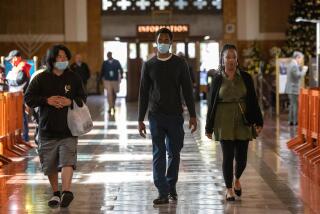Stress in trauma’s wake: Genes play a major role
- Share via
Ten years after terrorists hijacked four American jetliners and killed nearly 3,000 people, there’s growing evidence that people with a previous history of depression, or who have been traumatized before, are far more vulnerable to developing post-traumatic stress disorder (PTSD) than those without such histories. A new study suggests why, and supplies yet more evidence that genes play a powerful role in influencing who develops post-traumatic stress disorder after a traumatic event and who doesn’t.
The study, published in the Archives of General Psychiatry, is able to clarify the role of genes because its authors got a remarkable research opportunity and jumped on it. Between September 2007 and early February 2008, researchers at Northern Illinois University in DeKalb were gathering data for what they believed would be a long-term study looking at what factors influence a woman’s risk of sexual victimization. More than a thousand young women completed a survey that detailed any history of past sexual abuse, physical assault or other trauma.
Then, on Feb. 14, 2008, a lone gunman named Steven Kazmierczak, armed with a shotgun and two handguns, rampaged through the Northern Illinois University campus, killing five people and wounding 21 before fatally shooting himself. On a campus of some 19,000 full-time students, the shooting was a shared trauma to which many students had been exposed.
If researchers could return to the young women they already had enrolled, and gauge their stress reactions to the Feb. 14 shootings, they could address three problems of past post-traumatic stress disorder research: they could capture all subjects’ responses to the same trauma; they could assess participants’ stress reactions in the context of personal histories that each reported before the shared trauma took place--information that could not have been colored by the shootings; and finally, they could distinguish those who already suffered significant post-traumatic stress disorder symptoms before the shared trauma event from those who developed the disorder specifically in response to the shootings. In addition, the researchers could test subjects for three different genetic variations linked to the disorder and see just how powerful an influence they were when other factors were held constant.
And return to them they did. Some 586 completed follow-up surveys and interviews two to four weeks after the shooting and at about seven months after the event. DNA samples collected from 235 women at about eight months post-shooting allowed researchers to sort the subjects according to the specific genetic variant they carried on a single gene.
What they found was that women with two distinctive patterns of alleles on the serotonin transporter gene, which helps regulate the supply and availability of the mood chemical serotonin in the brain, were more likely to report symptoms of post-traumatic stress disorder two to four weeks after the shootings. This population was notable in that one in five of those who showed post-traumatic stress disorder at the two to four weeks post-shooting mark went on to develop clinical post-traumatic stress disorder when surveyed 34 weeks after the shootings.
A subject’s direct exposure to the shooting also powerfully influenced whether she would develop symptoms. But even when researchers took account of how directly exposed a subject was, those with the distinctive versions of the mental illness SLC6A4 gene were still more likely to develop post-traumatic stress disorder symptoms--and thus be at risk of developing the disorder later on.
To read what else researchers have learned since Sept. 11, 2001, about the disorder, check out The Times’ Health section, here.
More to Read
Sign up for Essential California
The most important California stories and recommendations in your inbox every morning.
You may occasionally receive promotional content from the Los Angeles Times.











